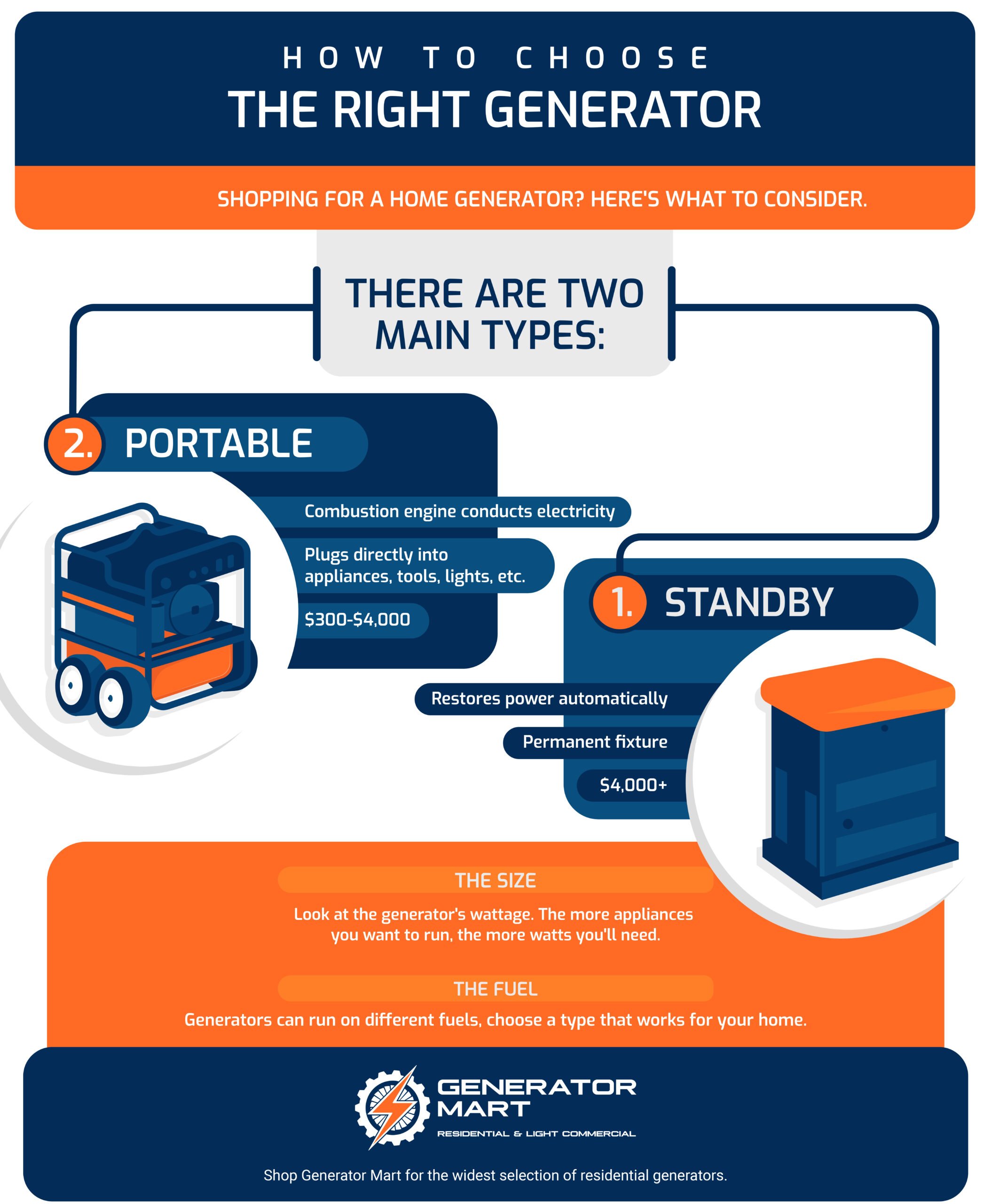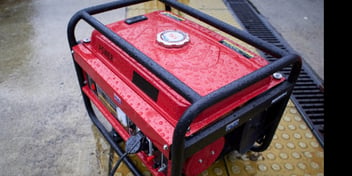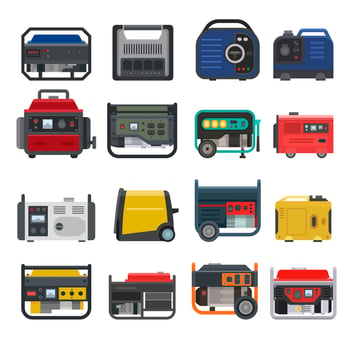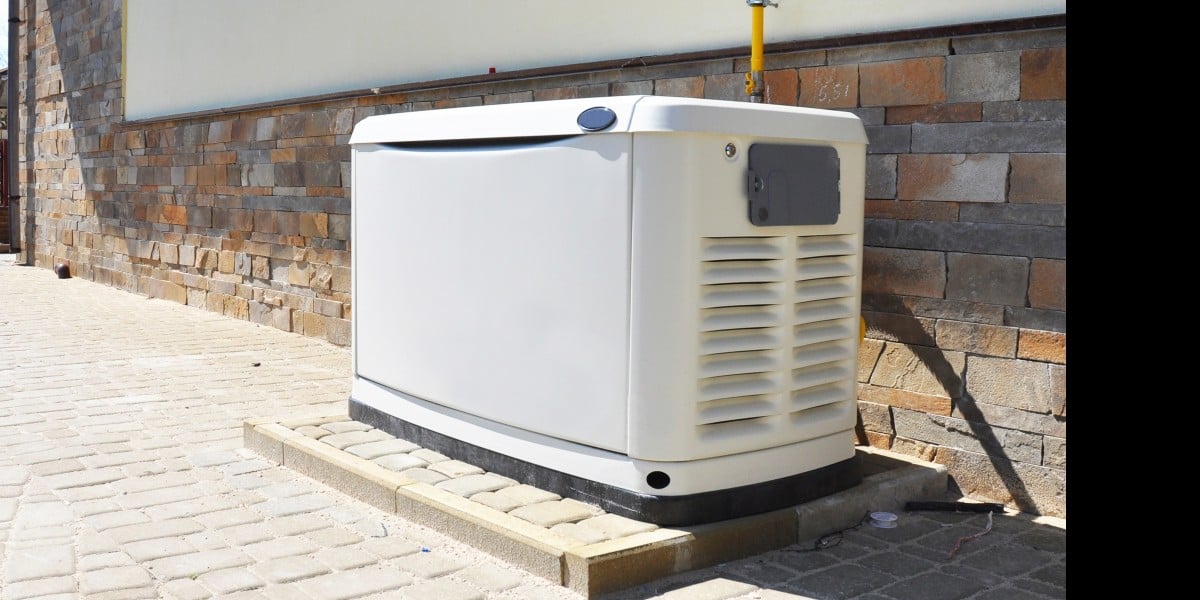
In an ideal world, there wouldn’t be natural disasters that cause wide-spread power outages, property damage, and loss of life. But the unfortunate truth is that we live in a world where there are hurricanes, tornadoes, snow storms, and earthquakes. And in many cases, it doesn’t take an incredibly severe storm to cause a power outage, but simply a snow storm that freezes power lines or heavy wind that causes a tree to fall. Whatever causes power outages to occur, whether it’s a hurricane, a squirrel, or a lightning strike, a residential generator can provide immense peace of mind.
There are obvious benefits of having a backup power generator, but choosing one that fits your home can be challenging — what brand is the best? What size generator should you get? At Generator Mart, our experts can help you decide. We offer a wide selection of the most trusted brands, all of the must-have accessories, and more.
What to Consider When Purchasing a Residential Generator
Standby/Automatic vs. Portable vs. Inverter
There are three types of backup power generators:
Standby or Automatic
A standby generator features an automatic transfer switch and can provide power to your whole home with power being out for only a few seconds. This type of generator runs on whatever fuel that your home uses, such as propane or natural gas. The generator is constantly monitoring utility power and completes self-tests to ensure that it will function properly when there is an emergency. Standby generators are a permanent fixture of your home and typically require professional installation. They are the most expensive, commonly above $4,000.
Portable
Typically powered by gas or diesel fuel, these generators have combustion engines to conduct electricity. They are often plugged directly into appliances or tools, but can also be wired into your home’s subpanels. Portable generators come in various sizes but typically supply enough power to run a TV, freezer, and refrigerator, tools, and lights, but not necessarily at the same time. These products can cost around $300 at the low end or up to $4,000.
Inverter
This type of generator uses an engine and an alternator to produce AC power, as well as a transformer to convert AC power to DC power. Inverter generators are fueled by either propane or gas. With an inverter generator, there is a constant flow of electricity to an appliance. They are more energy-efficient, are smaller, and more lightweight, and are able to fit into a car or RV. These can cost between $300 and $5,000.
The Size
When it comes to the size of the backup generator, homeowners should consider how often they lose power and what appliances or products need to be powered. If you only rarely lose power, a small to medium inverter or portable generator may be enough to get you through a few hours without power. However, if you lose power more frequently or for longer durations, you may want to consider a medium to large inverter or portable generator or a home standby.
When shopping for a residential generator, look at the product’s wattage. One way to estimate what size generator you need is to add up the wattage for each appliance you want to run during the power outage, from the fridge to the sump pump, from the air conditioner to hair dryers. However, it’s important to keep in mind that some appliances (air conditioner, fridge, sump pump) require a surge of watts when they are first turned on, which can skew your estimates.
If you’re looking to power your whole home, including ceiling fans, lights, outlets, washer and dryer, etc., you may need a generator that has up to 20,000 watts of power. If you can go without your washer and dryer and microwave, but still need the fridge, freezer, lights, and stove, you can probably get away with a generator with 8,000 watts. At the very least, most homeowners want a generator that will be big enough to power lights, heat/AC, fridge/freezer, and sump pump.
Fuel
Experts recommend getting a generator that will meet your minimum power requirements. When a generator is large enough to power unnecessary appliances, you’re also paying for the fuel to keep any unnecessary appliances running. If your home uses propane, you may want to choose a generator that also uses propane, and likewise with natural gas. Some standby generators run on diesel. Homeowners will also want to consider whether the fuel type is on-site, like propane or diesel, or if it’s pulled from a local utility, like natural gas.
If you’re considering purchasing a residential generator, look to the experts at Generator Mart for professional advice, guidance, and a wide selection of high-quality, reliable generators. We offer standby and portable generators from the most trusted brands, including Kohler, Briggs & Stratton, Cummins, and others. Don’t let a power outage disrupt your daily routine or quality of life. Shop Generator Mart today.
RELATED POSTS
Proin auctor nibh vitae urna lobortis, in vulputate erat facilisis. Sed lacinia lorem eget orci finibus, et maximus nisi sagittis.

What to Consider When Shopping For a Standby Generator
It’s impossible to predict when your home’s power will go out. While bad storms may be the most common cause for a power outage, there are many other...
Read more »
Benefits of Using a Portable Generator
No one likes to be without power at their house — food in your fridge may go bad, the sump pump doesn’t work, your heat or AC won’t work, and more....
Read more »
Consumer Generator Basics – Home Standby & Portable Generators
The two questions of “what kind of generator do I need” and “how big of a generator do I need” are the most common areas of concern for people...
Read more »

